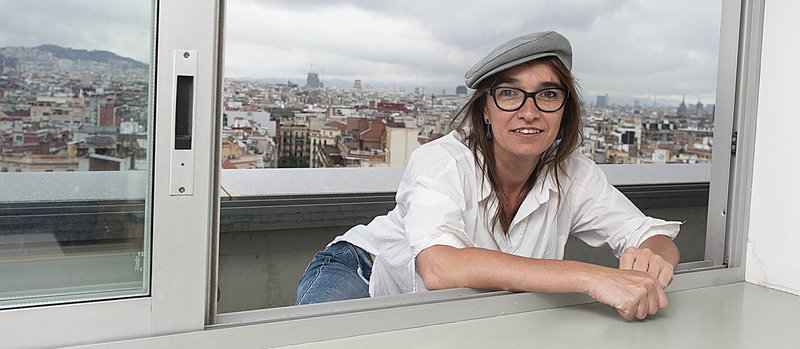The actor and cultural manager from Mataró, Montse Vellvehí, is the director of the Institut del Teatre’s Advanced School of Dramatic Arts (which teaches performance, stage design, directing and play-writing). She sees training as providing a toolbox that should enhance the artist’s talent. Her job is to train the future professionals who will fill the billboards of our country and who will have the task of pushing the theatre in new directions.
Are there too many actors in Catalonia?
It’s better to look at quality rather than quantity. We aspire to do things very well. Students here are very well trained. It’s true that not many can get into large productions, but in the theatre there are many other spaces to fill.
Does training raise the bar in the theatre industry?
Yes, there’s no doubt about it. We hope that the students will find the right balance between their own specific pathway and having a broad cross-section of knowledge so that they can exercise their profession with rigour.
There is an initial impulse to become an actor and then comes the theory. How can you stop knowledge overwhelming intuition?
At the Institut del Teatre we always try to provide tools that students can use to develop their imaginations, which allows them to develop as artists. Pure impulse, motivation, are crucial, because it’s marvellous to have a starting point from which to express yourself. We don’t want to clip their wings. We also want them to commit to the stage they are in. They develop their opinion for themselves, without any impositions. We shape the future of theatre and we want to give them the tools they need to express their view of their reality.
You are also an actor. Are you able to teach better if you’ve been one yourself?
It depends on the individual. From my point of view, it gives me strength and experience when it comes to explaining myself better to the class. However, they are different professions. There are many good teachers who are not acting any more. It’s not a science.
Are the subjects you teach flexible enough to absorb changes that are happening in the theatre?
We’re now working on a new curriculum, to adapt to these very changes. Some of the subjects are the same as 20 years ago, in substance, but the methodology has changed. Now the theatre is more multidisciplinary, it’s evolving.
A decade ago, there was talk about giving out degrees as if it was a university of the arts.
That’s a project that would be very welcome. We are now affiliated with the University of Barcelona. Our advanced qualification will now be a degree. The level must be university level.
Advanced theatre courses have multiplied in recent years.
Competition is good. If you have a monopoly over a form of training, you don’t have the need to improve.
You are now selecting students for next year.
It’s a lot of responsibility. With performance, for example, we really value the skills first and then also their potential, and their abilities. With the skills, we check the level of performance, their movement, singing and voice. Those who pass this first filter do a week of work to identify their potential. Of the 300 people who apply, we end up offering 36 places for performance (12 places for physical, 12 musical and 12 textual), 12 for stage design and 12 for direction and play-writing.
Does the Institut del Teatre help artists enter the profession?
We encourage projects between stage designers, directors, playwrights and performers. Last year, we released Amnè(i)s(t)ia. Now we’re preparing Flam, with Roger Bernat. It’s meant as the first step towards the students joining the labour market. As is the exhibition Quadrienal de Praga, which is being presented by a small group of students who are about to graduate. Or the Adrià Gual Prize, which has been awarding projects to groups from the Institut del Teatre for years.
There are also final degree projects that make the jump to the professional world.
Like the musical 9 to 5, which after playing at the TGB, will now be shown in Maldà. We also encourage them to join together and build companies.
A few years ago, the trend was more for everyone to find their own way.
We encourage more company-thinking and less the individual concept. These are difficult times.
Is there now a glass ceiling for new artists?
There are many people who work in small spaces, which aren’t even theatre spaces. We see it at the school. There is a very powerful fabric, although it’s fairly invisible.
Some older performers say that the Institut del Teatre does not produce top actors, but it does give them a very good minimum level.
A top actor becomes one over time. It’s hard to find someone who stands out if they haven’t been able to work on a large-scale production, but there are people who are very well trained, in singing, music, dancing and acting.
It seems to be a good time for writers, at least according to Victoria Szpunberg, who has recently revived various works.
I agree, although I do think it is difficult to generalise.
Current affairs make it easier to connect quickly to the spectator.
Art has to be heartbreaking. We’re expressing ourselves, and everyone has to do it the way they feel it, however they want. Art has to be uncomfortable, it is wonderful that we are questioned. At school, we also pose students challenges and ask them questions to find the formula to defend freedom of expression.
interview

